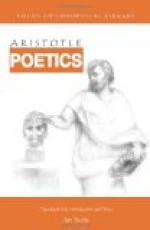Further, if it be objected that the description is not true to fact, the poet may perhaps reply,—’But the objects are as they ought to be’: just as Sophocles said that he drew men as they ought to be; Euripides, as they are. In this way the objection may be met. If, however, the representation be of neither kind, the poet may answer,—This is how men say the thing is.’ This applies to tales about the gods. It may well be that these stories are not higher than fact nor yet true to fact: they are, very possibly, what Xenophanes says of them. But anyhow, ’this is what is said.’ Again, a description may be no better than the fact: ‘still, it was the fact’; as in the passage about the arms: ’Upright upon their butt-ends stood the spears.’ This was the custom then, as it now is among the Illyrians.
Again, in examining whether what has been said or done by some one is poetically right or not, we must not look merely to the particular act or saying, and ask whether it is poetically good or bad. We must also consider by whom it is said or done, to whom, when, by what means, or for what end; whether, for instance, it be to secure a greater good, or avert a greater evil.
Other difficulties may be resolved by due regard to the usage of language. We may note a rare word, as in {omicron upsilon rho eta alpha sigma / mu epsilon nu / pi rho omega tau omicron nu}, where the poet perhaps employs {omicron upsilon rho eta alpha sigma} not in the sense of mules, but of sentinels. So, again, of Dolon: ’ill-favoured indeed he was to look upon.’ It is not meant that his body was ill-shaped, but that his face was ugly; for the Cretans use the word {epsilon upsilon epsilon iota delta epsilon sigma}, ‘well-favoured,’ to denote a fair face. Again, {zeta omega rho omicron tau epsilon rho omicron nu / delta epsilon / kappa epsilon rho alpha iota epsilon}, ‘mix the drink livelier,’ does not mean `mix it stronger’ as for hard drinkers, but ‘mix it quicker.’
Sometimes an expression is metaphorical, as ’Now all gods and men were sleeping through the night,’—while at the same time the poet says: ’Often indeed as he turned his gaze to the Trojan plain, he marvelled at the sound of flutes and pipes.’ ‘All’ is here used metaphorically for ‘many,’ all being a species of many. So in the verse,—’alone she hath no part . . ,’ {omicron iota eta}, ‘alone,’ is metaphorical; for the best known may be called the only one.
Again, the solution may depend upon accent or breathing. Thus Hippias of Thasos solved the difficulties in the lines,—{delta iota delta omicron mu epsilon nu (delta iota delta omicron mu epsilon nu) delta epsilon / omicron iota,} and { tau omicron / mu epsilon nu / omicron upsilon (omicron upsilon) kappa alpha tau alpha pi upsilon theta epsilon tau alpha iota / omicron mu beta rho omega}.
Or again, the question may be solved by punctuation, as in Empedocles,— ’Of a sudden things became mortal that before had learnt to be immortal, and things unmixed before mixed.’




